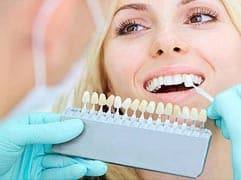Stages of Tooth Decay?
Tooth decay is one of the most common reasons that patients experience tooth pain. Tooth decay begins with the enamel starting to break down. This creates pockets of decay on the outer surface of the teeth. Decay occurs from acidic damage to the structure of the tooth. The harmful acid is produced by bacteria which is found in plaque, the sticky film which forms when saliva metabolizes sugary foods left in the mouth. Some forms of tooth decay can be treated with good oral hygiene and routine visits to the dentist.
Below is a summary of the various stages of tooth decay.
- White Spots
The initial stage of tooth decay starts when chalky white areas appear on the surface of the tooth from the loss of calcium and the build-up of plaque. Bacteria in the plaque starts to metabolize sugars from the food that is consumed. Over time, the buildup of these acids causes the tooth enamel to deteriorate. This process is called the demineralization of the tooth’s surface. During this phase, it is possible to reverse the effects of tooth decay with the proper treatment. Treatment options should always be reviewed with your dental professional and may include using a correct brushing technique, fluoride toothpaste, or applying a topical fluoride treatment.
- Enamel Decay
In the second stage of tooth decay, the enamel begins to break down below the tooth’s surface. During this stage, the natural remineralization process is unable to properly restore the enamel and minerals. This results in the formation of a lesion within the tooth. As the decay continues, the surface of the tooth can break, which is not reversible. Once the tooth breaks, you should seek professional dental attention right away.
- Dentin Decay
Stage three of tooth decay is also called dentin decay. When it is left untreated, bacteria and acids continue to dissolve the enamel and there is a risk of reaching the dentin. The dentin is the part of the tooth located between the enamel and pulp. Once the decay moves into the dentin, the pain starts to get more intense. Once enough of the sub-surface enamel is weakened from the loss of calcium and phosphate minerals, the enamel will collapse and cavity forms. Once this occurs, a dental filling is most likely necessary in order to restore the tooth.
- Pulp Involvement
The pulp is considered to be the center of the tooth. It is comprised of living tissue and cells which are called odontoblasts. Cells of the pulp produce dentin and dentin acts as the connective tissue between the pulp and the enamel. Once the pulp of a tooth is infected with bacteria, pus can form which kills the blood vessels and nerves within the tooth. This is often causes a toothache and can result in constant pain. Once this stage is reach, most patients must undergo root canal therapy for treatment.
- Formation of an Abscess
The formation of an abscess is the final stage of tooth decay. It is also the most painful stage. Once the infection reaches the root tip of the tooth, it is possible for the bone to also be infected. The gums and tongue often swell, which can impact your speech and put you at risk for additional diseases. At this stage, oral surgery may be required.
- Loss of the Tooth
When tooth decay is left untreated, it is possible that the tooth will be lost and need to be extracted.
Good oral hygiene, frequent visits to the dentist and prompt treatment for any signs of tooth decay are all critical in the preservation of your teeth. If you have any oral issues, contact your dentists right away.
More on Tooth Decay : Fix Tooth Decay
Actual Patient Reviews
We have so many terrific reviews it's impossible for us to list them all! Thanks for supporting Iowa Dental Group with your gratitude.
Dental Office Location
Iowa Dental Group prides ourselves in offering the highest quality dentistry at a fair and reasonable fee.
Des Moines, Ia 50311
(515) 277-6358
iowadentalgroup@hotmail.com
https://www.iowadentalgroup.com
Iowa Dental Group Contact Form
Our Des Moines' Dentists Bob Margeas DDS & Nicholas Economos are eager to help provide any answers you may have. Contact us today regarding optimal oral health.
Dentist Office Hours
Our Dentists look forward to answering any dentistry related questions or dental concerns you may have regarding your overall oral health and smile.
Office Hours
| Monday: | 7:30am - 5:00pm |
| Tuesday: | 7:30am - 5:00pm |
| Wednesday: | 7:30am - 5:00pm |
| Thursday: | 7:30am - 5:00pm |
| Friday: | Closed |
| Saturday: | Closed |
| Sunday: | Closed |
















